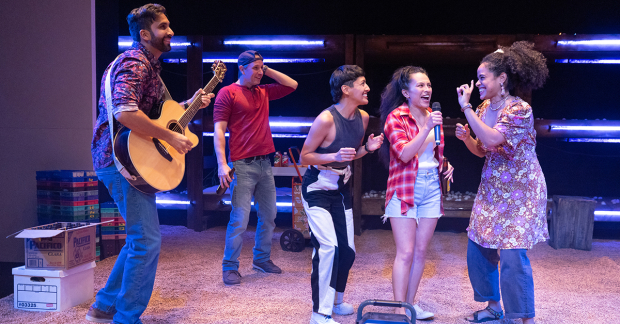Review: A Mushroom in Need of More Seasoning at People's Light
Eisa Davis’s new play bites off more than it can chew in its world premiere production.

(© Mark Garvin)
If you've eaten a mushroom recently, chances are it was grown in Kennett Square, Pennsylvania. The self-proclaimed fungus capital of the world serves as the backdrop for Eisa Davis's Mushroom, a voluble, unfocused exploration of the people who work in the shadows to put food on America's table. An entry in People's Light's New Play Frontiers program, an initiative dedicated to telling underrepresented local stories, it squanders a worthy premise by hammering home political messages rather than portraying the community with specificity and compassion.
The bucolic campus of People's Light sits just a few miles from Kennett Square, a wealthy town propped up by the labor of undocumented immigrants. Unlike typical migrant workers, who spend a season picking crops before moving along to their next job, the mushroom foragers of Chester County tend to put down roots, creating a parallel world to the affluent neighbors who consume the fruits of their toil. Davis embedded herself in the Kennett community, researching and interviewing mushroom pickers at local farms, and many of their actual stories make it to the stage.
Too many, in fact. In a worthy attempt to show the breadth and depth of this society, Davis never settles on a single storyline long enough to fully develop it. The audience is left to grasp at straws as the action moves between individuals and families without clearly defining how their experiences relate to each other. And although the play generates basic compassion for its hardworking, good-hearted characters, they often seem less like fully formed human beings and more like vehicles for didactic discourse.
Each person Davis introduces over the course of a three-hour running time could merit their own play. There's Lety (Laura Crotte), a gritty, determined picker with 20 years on the job, who faces the threat of bodily injury, the fear of deportation, and the reality of sexism and harassment in a man's profession. Her daughter Edit (Kenia Munguia), a DACA Dreamer, works around the clock to achieve her goal of becoming a registered nurse. "If you come to the hospital, if you're hurt, if you're about to die, I will care for you," she says in one of the play's many disjointed monologues. "I'm undocumented and I will care for you."
Lety works on a family farm owned by Tyler (Todd Lawson), an Iraq veteran living with post-traumatic stress disorder – a plot point introduced and almost immediately discarded. Her colleagues include Epifanio (Angel Sigala), an opportunistic young immigrant driven to make horrible choices after suffering a workplace injury, and Rain (Maribel Martinez), an American-born former investment banker who gives up her corporate stability for the freedom of itinerant life. They all exist under the watchful eye of Ignacio (Michael G. Martinez), a laborer turned business owner, who functions as a de facto mayor of the Latinx community.
The long first act spends too much time setting up the central points of conflict, which feel attenuated when they come to a resolution in the second act. A romantic relationship between Edit and Natarajan (the nondescript Ahsan Ali), a wealthy technocrat from India, seems to function solely as a dramatic contrivance. Davis could use their unlikely courtship to examine the unequal value society places on different immigrant groups – knowledge workers versus hard laborers – but instead, it merely sets up a predictable yet underwritten denouement.
The script also relies too heavily on an ever-present narrator, referred to by the twee moniker Third Person Omniscient, to flesh out details that should be revealed through the interpersonal communications of the characters. Although Janice Amaya is a compelling and appropriately spectral presence, the device begins to feel like a stopgap to distract from holes in the writing. In David Mendizábal's generally static production, Third Person Omniscient also seems to pop up whenever a scene approaches any sort of forward motion, momentarily stopping the action in its tracks.
The action also unfolds in English and Spanish, reflecting the linguistic diversity and code switching inherit in the community, with translations projected onto the walls of Efrem Delgadillo Jr.'s abstract set. Unfortunately, at the performance I attended, the subtitles malfunctioned at several points, and at other times, the projected text did not sync correctly with what the actors were speaking in either language. Davis deserves commendation for attempting to create a theatrical space where all feel welcomed and engaged, but the sloppy execution causes regrettable and unnecessary confusion.
People's Light began cultivating Mushroom a decade ago, and despite multiple drafts and developmental productions, it still comes across like a work in progress. The immigrant community of Kennett Square is not a monolith, and their stories don't exist to make tidy political arguments. In revising the script for future productions, Davis will hopefully home in on an area of focus and realize that the universal is best expressed through specificity.








